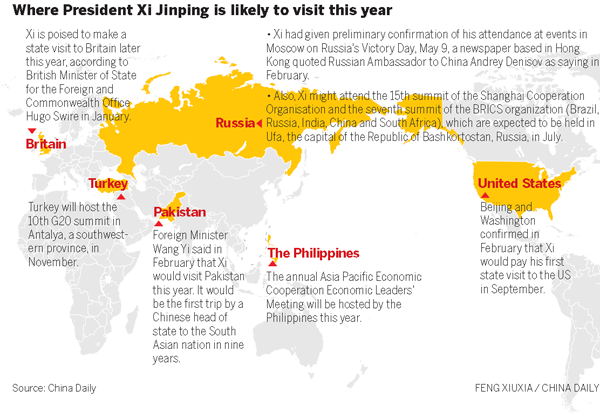

 |
As China's biggest annual political event approaches with spring, speculation is increasing about what destination President Xi Jinping will choose for his first overseas visit of the year, as a trip often follows the annual key legislative and consultative meetings, or two sessions.
With a slew of mega cooperation initiatives mapped out over two years, China's global influence has seen a surge, as its economic prowess, and its bonds with the rest of the world, especially its neighbors, have strengthened, observers said.
The most eye-catching proposal, to revive the Silk Road trading routes, is likely to continue to be high on the agenda for the upcoming two weeks of meetings of the National People's Congress and National Committee of the Chinese People's Political Consultative Conference.
More details about the Silk Road Economic Belt and the 21st Century Maritime Silk Road initiatives — networks connecting China with Europe through a host of Asian economies — are expected to be revealed this year, bringing them closer to reality.
Such plans are driven by China's huge outbound investment, which is expected to exceed $1.25 trillion in the decade from 2015, and will help finance a large-scale infrastructure boom among developing economies, starting with China's neighbors.
Jia Xiudong, a senior international affairs researcher at the China Institute of International Studies, said China's current diplomacy emphasizes shared benefits of the nation's rapid development.
Xi visited 18 countries on four continents last year, many of them China's neighbors, and China signed more than 500 cooperation agreements.
More than 50 countries along the ancient Silk Road voiced their willingness last year to participate in the initiatives proposed by Xi in 2013.
Gao Zugui, an international political studies expert at the China Institutes of Contemporary International Relations, said Beijing has improved the crucial neighborhood environment, and the momentum is expected to be maintained this year.
In terms of China-Japan relations, the two countries will continue to interact, Gao said. Their ties have been troubled but have thawed some since November.
All seven members of the Standing Committee of the CPC Central Committee's Political Bureau attended the Peripheral Diplomacy Work Conference in October 2013.
Yan Xuetong, dean of the Institute of Modern International Relations at Tsinghua University, told Japanese media recently that former Chinese leader Deng Xiaoping's biggest goal was to make China rich, while Xi is striving for national rejuvenation and respect from the international community.
 J-11 fighters in air exercise
J-11 fighters in air exercise PLA soldiers operating vehicle-mounted guns in drill
PLA soldiers operating vehicle-mounted guns in drill Beauties dancing on the rings
Beauties dancing on the rings Blind carpenter in E China's Jiangxi
Blind carpenter in E China's Jiangxi Top 10 highest-paid sports teams in the world
Top 10 highest-paid sports teams in the world In photos: China's WZ-10 armed helicopters
In photos: China's WZ-10 armed helicopters UFO spotted in several places in China
UFO spotted in several places in China Certificates of land title of Qing Dynasty and Republic of China
Certificates of land title of Qing Dynasty and Republic of China  Cute young Taoist priest in Beijing
Cute young Taoist priest in Beijing Obama is sowing discontent in S.China Sea
Obama is sowing discontent in S.China Sea Rescuers work through night to reach cruise ship survivors
Rescuers work through night to reach cruise ship survivors Driving through limbo
Driving through limbo Facing down MERS
Facing down MERSDay|Week